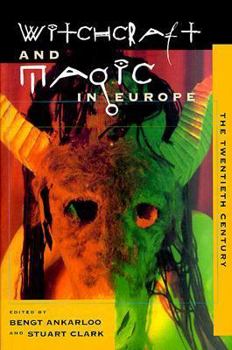Witchcraft and Magic in Europe, Volume 5: The Eighteenth and Nineteenth Centuries
(Book #5 in the Witchcraft and Magic in Europe Series)
The roots of European witchcraft and magic lie in Hebrew and other ancient Near Eastern cultures and in the Celtic, Nordic, and Germanic traditions of the Continent. For two millennia, European folklore and ritual have been imbued with the belief in the supernatural, yielding a rich trove of histories and images.
Format:Paperback
Language:English
ISBN:0812217063
ISBN13:9780812217063
Release Date:October 1999
Publisher:University of Pennsylvania Press
Length:288 Pages
Weight:1.15 lbs.
Dimensions:1.1" x 6.1" x 9.2"
Customer Reviews
2 ratings
She lives.....
Published by Thriftbooks.com User , 22 years ago
WITCHCRAFT AND MAGIC IN EUROPE -- THE EIGHTEENTH AND THE NINETEENTH CENTURIES is the fifth volume in the 6-part W & E series, and the first I have read, but I will read others. This excellent body of work is long overdue and I am happy to see the complete story finally emerging, although as editors Bengt Ankarloo and Stuart Clark point out this is only the beginning. W & M is a synopsis of current research (through 1998) by the academic community in Europe. Until now the Roman Catholic Church has been viewed as the chief source of persecution of "witches." While the RCC was involved with witchcraft (in more ways than one as it turns out) heretofore historical research about witchcraft was biased as it was largely based on RCC records. The studies in W & E go beyond the RCC records and include work undertaken by hundreds of scholars engaged in the difficult task of ferreting out information from less well organized secular and non-RCC sources scattered across Europe. Witchcraft in Europe has been defined in dozens of ways and the authors use the terms witchcraft and magic interchangably since anyone thought to engage in magical practices was viewed as a sorcerer (male) or magician or witch (female). Magicican, Magi, Witch, Sorcerer all mean "wise one". One has to wonder if the current craze for Harry Potter would be so great if the protagonist was Harriet Potter and she was a witch. The amazing finding of the W & E scholars (who insist they are still compiling the story) is that the Enlightenment did not end witchcraft and nor did the Reformation before it. Magic was alive and well before and after both movements in spite of the extreme efforts of Protestant leaders like Luther, Calvin, and Wesley to root out RCC herersy and magical practices like turning wine into the blood of Christ and removing evil spirits through exorcism (though some Protestants continued to do faith healing), as well as the attempts of Rationalist thinkers Voltaire, Hume, Locke and others to rid thinking of magic. Eventually, the Protestants and the Rationalists found themselves locked in conflict since belief in God was not "rational". The focus of the Protestants changed from eradicating magic to limiting magic. In his section entitled 'Witchcraft and Magic in Enlightenment, Romatic and Liberal Thought' Roy Porter says "...at the grassroots 'superstitions' did not dissolve like mist in the sunshine but proved highly tenacious -- driving reformers to dispair! And the educated themselves continued to uphold a mixed bag of beliefs." For example, while Whigs of 18th Century England tried mightly to bring the Neoclassical movement to life in all parts of England via architecture, art, clothing, and literature, but cheap thrillers like the "Castle of Otranto" held the people in thrall--not Alexander Pope's Essay on Man. Jane Austin, whose own father was a village vicar, made fun of the "Gothic" thrillers in her book 'Northanger Abbey' but even this popular author could not
The end of the witch hunt
Published by Thriftbooks.com User , 23 years ago
The fifth volume of this impressive series covers the decriminalization of witch offenses. Neither in space nor in time did this process unwaver, according to the contributions of the three authors. The American historian, Brian Levack, begins his article with a synopsis ("The Decline and End of Witchcraft Prosecutions") of decriminalization's various phases. Emphasis is placed upon judicial history and its system. One of Levack's major points is that judicial changes preceded the intellectual transformations of a later date. The Dutch specialist in witchcraft, Marijke Gijswijt-Hofstra, has called her contribution "Witchcraft after the Witch-Trials". And, as shown in the article's title, the continuity of the belief in witchcraft is a central aspect of her essay. She illustrates how the belief in witchcraft and sorcery continued as a village phenomenon long after the authorities ceased to show judicial interest in the matter. Personally, I enjoy Roy Porter's fascinating probe into the scholarly and intellectual changes that occurred in relation to magic and sorcery. Rationalism's confidence in reason, as a safeguard against what was increasingly considered to be illusions, delusions and superstition, is the starting point of topics on Voltaire and other scholars of the Enlightenment. The article contains passages, too, on how the occult and magic were presented in the arts and literature of this era. Most delightful, however, is the part that covers Russia's struggle to rid being branded as a nation of shamans during the 18th-century





